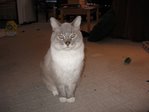 The question teeters on absurdity, surely. Aren’t poets usually mystical-minded, bookish types with weak eyes or, maybe young girls under the age of seventeen? We want our presidents to be tough, decisive men or women, rough and ready to fight. (I don’t mean swaggering, smirking southern wannabes who find it mighty convenient to use their Pappy President’s influence to skip out of serving in a war when their time comes; but then send others to fight and die when they get their fannies on the president’s chair.)
The question teeters on absurdity, surely. Aren’t poets usually mystical-minded, bookish types with weak eyes or, maybe young girls under the age of seventeen? We want our presidents to be tough, decisive men or women, rough and ready to fight. (I don’t mean swaggering, smirking southern wannabes who find it mighty convenient to use their Pappy President’s influence to skip out of serving in a war when their time comes; but then send others to fight and die when they get their fannies on the president’s chair.)Say what you will about Andrew Jackson’s massive insensitivity to Native or African Americans, he never shirked his duties during wartime. And in words eerily applicable to today, Old Hickory defeated Harvard-educated John Quincy Adams in 1828 with many of the old soldier’s fans chanting: “Adams can write/but Jackson can fight.”
That’s doggerel--good spin, but not poetry. Anyway, Adams was no poet.
But we’ve had two truly great presidents who were poets: Thomas Jefferson and Abraham Lincoln. Say what? Name a poem either man wrote. Neither ever called himself a poet. But each was. They thought and wrote and often spoke (even shy Jefferson, and Lincoln who rarely spoke in public) in a cadenced language. Candor also characterized Lincoln. When stumped by a tricky question, he said frankly, I don’t know the answer. Imagine hearing that today.
But their genius—and Jefferson and Lincoln were in the palm of genius—resulted in part because they were poets with a profound understanding of the heights and depths of language. John Adams told Jefferson to draft the Declaration of Independence in 1776 because of his “certain felicity of expression.” The result was imperishable poetry masquerading as prose, poetry that helps rule our nation.
 Listen again to the opening lines of The Declaration of Independence. But put Jefferson’s words in the blank verse most of today’s celebrated poets prefer, and trust your ear:
Listen again to the opening lines of The Declaration of Independence. But put Jefferson’s words in the blank verse most of today’s celebrated poets prefer, and trust your ear: "We hold these truths
to be self-evident,
That all men are created equal,
that they are endowed
by their Creator with certain
unalienable Rights,
that among these
are Life, Liberty
and the Pursuit of Happiness."
That’s poetry, piercing our hearts, souls, and brains.
 Now listen to Lincoln, a truly superior stylist. In his First Inaugural the Rail Splitter summoned the nation to honor our past, ingrained in “the mystic chords of memory” and in “the better angels of our nature.” There was a poet speaking.
Now listen to Lincoln, a truly superior stylist. In his First Inaugural the Rail Splitter summoned the nation to honor our past, ingrained in “the mystic chords of memory” and in “the better angels of our nature.” There was a poet speaking.Lincoln wasn’t Jefferson’s equal intellectually (who was?) but he was a greater poet. The self-taught Lincoln, said one historian years ago, possessed “a profoundly emotional apprehension of experience.” As a result, his famous address at Gettysburg in 1863 and his Second Inaugural (only one single spaced typed page) are rightly considered among the greatest speeches of all time.
Want more proof? Read Garry Wills’s Pulitzer Prize-winning book, “Lincoln at Gettysburg” (1992). Lincoln’s classical rhetoric “proved” that the American Dream had not and would not die. At our best, we act on the poetry of 1776 and 1863. If natural or self-induced amnesia overtakes us, we’re doomed.
Take my advice, and re-read Lincoln’s Gettysburg Address. But read the words, and read them aloud, as Lincoln, the poet, scribbled them on the back of an envelope.
"Four score and seven years ago,
our fathers brought forth on this continent,
a new nation,
conceived in liberty
and dedicated to the proposition
that all men are created equal."
Now turn the last paragraph, so rich in historical irony:
"The world will little note,
nor long remember,
what we do here,
but it can never forget
what they did here."
A few words later Lincoln soars to greatness as a prophetic poet:
"That we here highly resolve
that these dead
shall not have died in vain--
that this nation, under God
shall have a new birth of freedom—
and that government
of the people,
by the people,
for the people,
shall not perish from the earth."
Lincoln’s “profound emotional apprehension of experience” was never more evident than in his short Inaugural address in 1864. The war continued. Rancor raged. The truly hateful called Lincoln a “baboon” and “Abraham Africanus.”
Yet the re-elected president was the epitome of decency and humanity. Again I cast Lincoln as a poet.
"Fondly do we hope—
fervently do we pray—
that this mighty scourge of war
may speedily pass away.
Yet, if God wills that it continue,"
[Lincoln continued]
‘the judgments of the Lord
are true
and righteous altogether.’”
M.J. Workman says it’s time for another poet in the Oval Office!
mjworkman39@yahoo.com




No comments:
Post a Comment